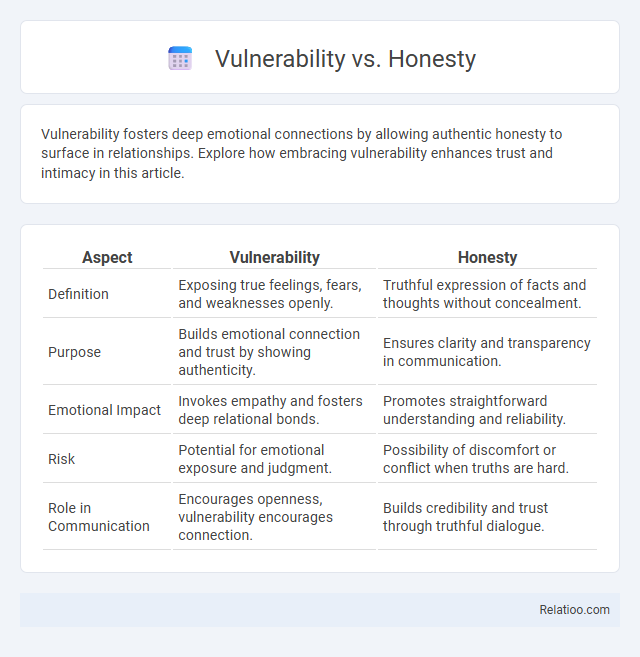Vulnerability fosters deep emotional connections by allowing authentic honesty to surface in relationships. Explore how embracing vulnerability enhances trust and intimacy in this article.
Table of Comparison
| Aspect | Vulnerability | Honesty |
|---|---|---|
| Definition | Exposing true feelings, fears, and weaknesses openly. | Truthful expression of facts and thoughts without concealment. |
| Purpose | Builds emotional connection and trust by showing authenticity. | Ensures clarity and transparency in communication. |
| Emotional Impact | Invokes empathy and fosters deep relational bonds. | Promotes straightforward understanding and reliability. |
| Risk | Potential for emotional exposure and judgment. | Possibility of discomfort or conflict when truths are hard. |
| Role in Communication | Encourages openness, vulnerability encourages connection. | Builds credibility and trust through truthful dialogue. |
Defining Vulnerability and Honesty
Vulnerability involves exposing one's true feelings and uncertainties, representing a state of emotional openness that fosters genuine connections. Honesty centers on telling the truth and being transparent in communication, ensuring trustworthiness without concealing facts or emotions. Both vulnerability and honesty are crucial for authentic relationships, with vulnerability emphasizing emotional exposure and honesty focusing on truthfulness.
The Core Differences Between Vulnerability and Honesty
Vulnerability involves openly sharing one's fears, weaknesses, and emotions, highlighting personal exposure and authenticity. Honesty centers on truthfulness and transparency in communication, prioritizing factual accuracy without necessarily revealing deeper emotional states. The core difference lies in vulnerability's emotional openness contrasted with honesty's commitment to truth, where vulnerability invites empathy and connection, and honesty ensures trust and clarity.
The Role of Vulnerability in Human Relationships
Vulnerability plays a crucial role in human relationships by fostering deep emotional connections and trust between individuals. It allows people to express their true feelings and experiences without fear of judgment, promoting authenticity and mutual understanding. Embracing vulnerability leads to stronger bonds and enhances empathy, which are essential for maintaining healthy and meaningful interactions.
Honesty: More Than Just Telling the Truth
Honesty goes beyond simply telling the truth by fostering trust and deepening connections through genuine transparency and integrity. It requires balancing vulnerability with strength, allowing your true self to be seen without fear of judgment, which strengthens relationships and personal growth. Your commitment to honesty creates a foundation for authentic communication and meaningful bonds.
Why Vulnerability Feels Riskier Than Honesty
Vulnerability feels riskier than honesty because it involves exposing deeper emotions and uncertainties that can lead to judgment or rejection. Unlike honesty, which often conveys facts or straightforward truths, vulnerability requires sharing personal struggles, fears, or imperfections, making one more susceptible to emotional harm. The fear of being misunderstood or exploited intensifies the perceived risk of vulnerability compared to simple honesty.
The Power of Combining Vulnerability and Honesty
Combining vulnerability and honesty creates a powerful foundation for authentic connections, fostering trust and deep understanding in your relationships. Vulnerability allows you to express true emotions without fear of judgment, while honesty ensures clarity and transparency in communication. Together, they empower you to build resilience and meaningful bonds that promote personal growth and emotional well-being.
Common Misconceptions About Vulnerability and Honesty
Many people mistakenly equate vulnerability with weakness, when in fact it requires immense courage and self-awareness. You might also confuse honesty with vulnerability, but honesty is about truth-telling, whereas vulnerability involves exposing your deeper emotions and insecurities. Understanding the differences can improve your communication and build stronger, more authentic relationships.
Practical Ways to Cultivate Vulnerability and Honesty
Cultivating vulnerability involves practicing self-awareness and embracing imperfections by openly sharing thoughts and feelings without fear of judgment, which fosters deeper connections and trust. Honesty can be strengthened by consistently expressing truth aligned with personal values while maintaining empathy to ensure respectful communication. Regular reflection, active listening, and creating a safe environment for dialogue support the integration of both vulnerability and honesty in relationships and personal growth.
The Impact of Vulnerability vs Honesty on Trust-Building
Vulnerability fosters deeper emotional connections by allowing Your authentic self to be seen, which significantly enhances trust in relationships. Honesty provides clarity and reliability, building a foundation of credibility that supports long-term trust. Combining vulnerability with honesty creates a powerful synergy that cultivates genuine trust and strengthens interpersonal bonds.
Choosing Vulnerability or Honesty: When and Why
Choosing between vulnerability and honesty depends on your goals and the context of communication. Vulnerability fosters emotional connection and trust by revealing feelings and uncertainties, while honesty ensures clarity and transparency without necessarily exposing deeper emotions. You should opt for vulnerability when building intimacy or seeking empathy, and prioritize honesty when accuracy and straightforwardness are essential.

Infographic: Vulnerability vs Honesty
 relatioo.com
relatioo.com